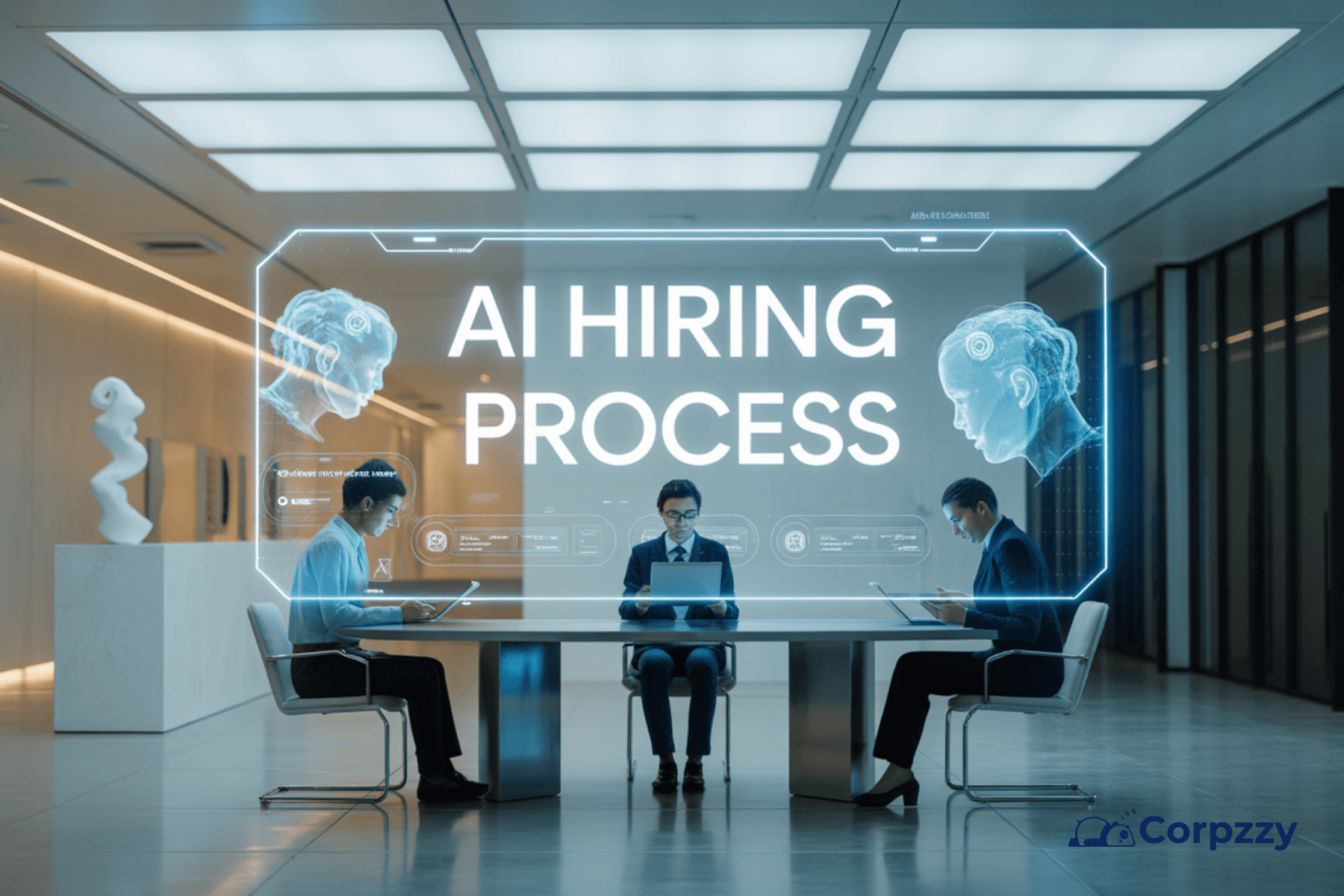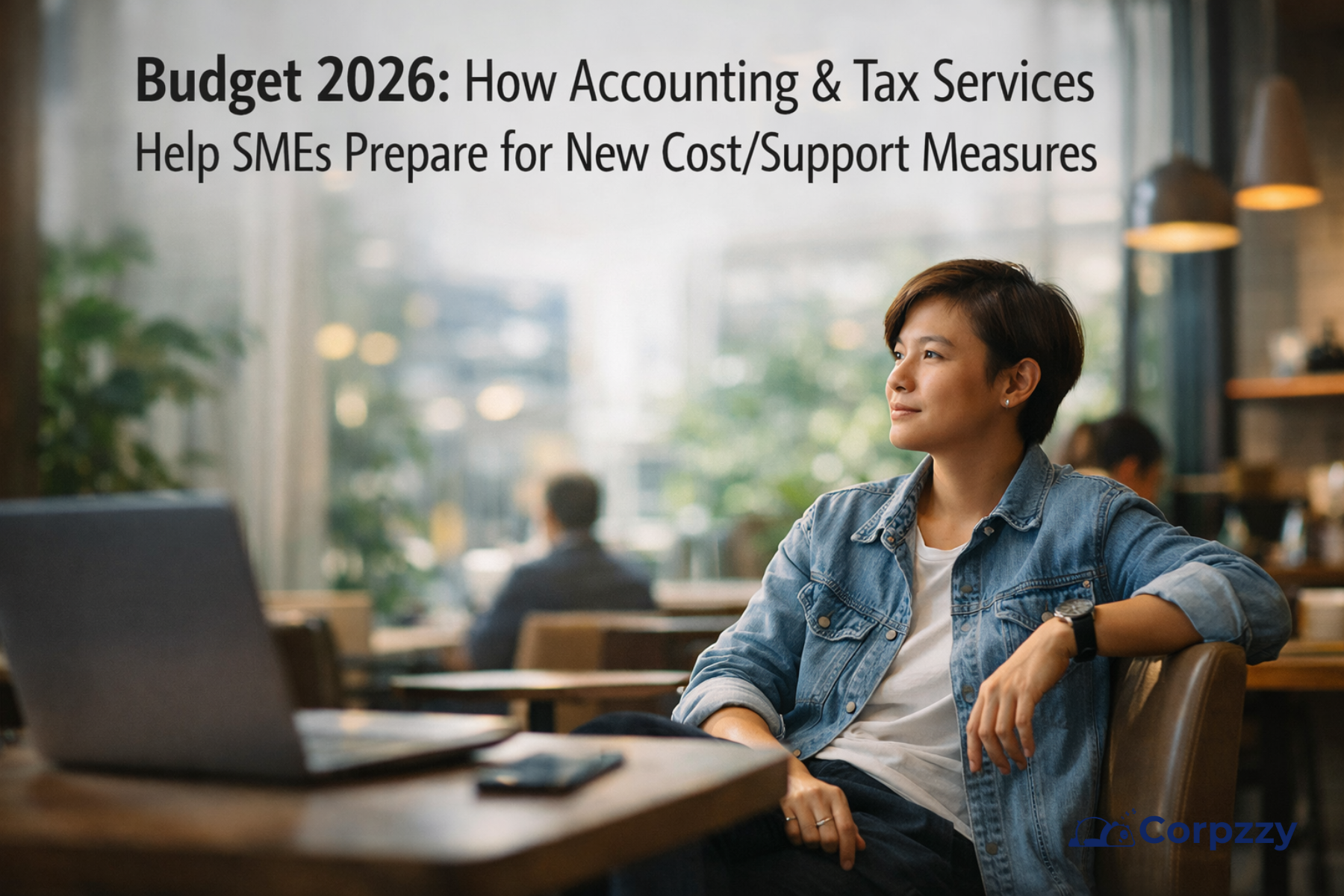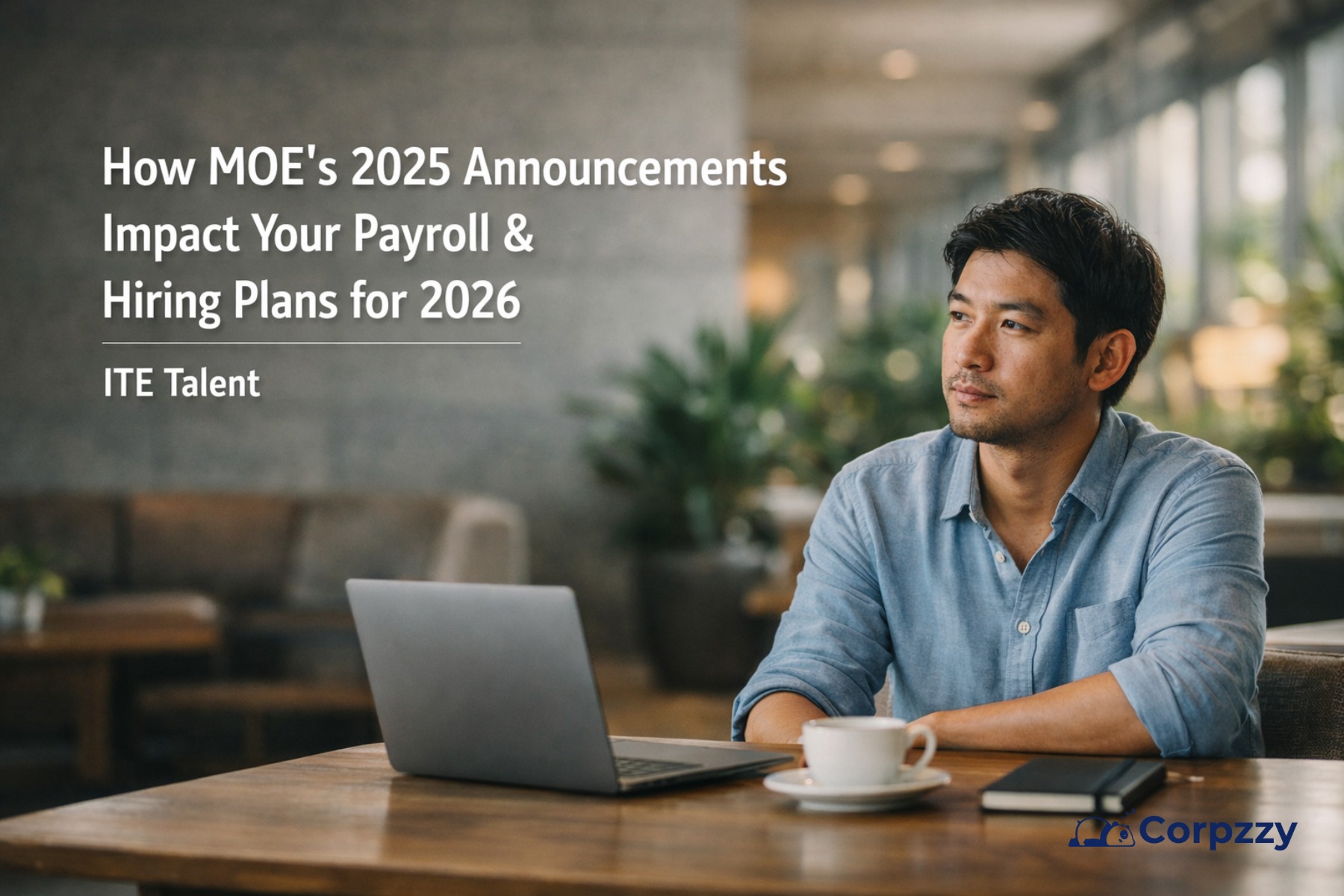Want to Use AI in Your Hiring Process? Ensure Your Company Is Compliant from Day One
Want to Use AI in Your Hiring Process? Ensure Your Company Is Compliant from Day One
Outline

Artificial Intelligence (AI) is revolutionising the hiring process across industries in Singapore. From resume screening to predictive hiring models, AI tools are helping businesses hire smarter and faster. But as these tools become more integrated into HR workflows, ensuring compliance with Singapore’s legal and regulatory frameworks becomes critical. Businesses that neglect this foundational step risk running afoul of employment laws and Ministry of Manpower (MOM) regulations.
If your business plans to use AI for hiring, the first step is proper incorporation. You must establish a legally registered entity with ACRA and structure your hiring processes in line with the Employment Act. This ensures your AI-based hiring tools operate within legal bounds. Compliance from day one protects your company’s reputation and reduces long-term risks.
The Rise of AI in Recruitment in Singapore
AI recruitment platforms are now used by startups and multinational companies alike in Singapore. These tools streamline sourcing, filtering, and even initial interviews. Machine learning models can rank candidates based on fit, using resume parsing and behavioural assessments. This makes the hiring cycle shorter and improves talent acquisition efficiency.
However, the use of AI must be handled responsibly. Singapore’s government expects transparency and fairness in hiring, regardless of whether human or AI tools are used. Bias in algorithmic decision-making is a known concern. Businesses must implement safeguards and audit mechanisms to ensure AI usage is ethical and aligned with HR best practices.
Why Incorporation and Legal Setup Matter
Before integrating AI tools, your company must be formally incorporated in Singapore. This means registering your business with the Accounting and Corporate Regulatory Authority (ACRA). Once registered, you gain access to necessary hiring infrastructure such as CPF registration, employment contracts, and eligibility for Employment Pass (EP) sponsorship. Incorporation also ensures that your HR and hiring policies are governed by recognised Singaporean frameworks.
Without a properly structured entity, your hiring practices—AI-enabled or not—may lack legal enforceability. For example, employment contracts or EP applications require an ACRA-registered business entity. Incorporation lays the foundation for robust compliance across all hiring activities. This becomes especially vital when AI is used to manage and automate those processes.
Employment Pass Compliance in AI Hiring
AI tools are frequently used to help shortlist and screen candidates for high-skilled positions, many of whom may be foreigners. In Singapore, employing foreign professionals requires adherence to strict Employment Pass (EP) rules governed by the Ministry of Manpower. A company must show that it meets eligibility criteria such as business viability, local hiring practices, and minimum salary thresholds.
If your business uses AI to identify EP candidates, the hiring flow must be compliant from the start. EP applications must include justifications, contracts, and proper documentation that align with local hiring norms. AI can aid the selection process, but the responsibility for MOM compliance remains with the employer. Having structured hiring protocols and professional corporate secretary support is essential.
Structuring Your HR Team for AI Integration
AI doesn’t replace HR—it enhances it. But to function properly, your HR systems need to be built on a compliant foundation. From offer letters to salary benchmarking and probation monitoring, your HR framework must reflect local norms. Integrating AI into a poorly structured HR system can create more problems than it solves.
Incorporated businesses in Singapore can benefit from services like outsourced HR, employment contracts drafting, and payroll setup. These services form the backbone upon which AI tools can operate. Without proper HR infrastructure, AI-driven hiring could result in missed deadlines, invalid offers, or regulatory oversights. We help ensure your HR foundation is strong before automation begins.
AI Compliance Risks for Hiring in Singapore
One of the biggest risks with AI in hiring is the potential for bias and discrimination. Algorithms may unintentionally favour or exclude candidates based on data patterns. Singapore takes workplace discrimination seriously, with Tripartite Guidelines governing fair employment practices. Non-compliance could lead to sanctions or EP application rejections.
If your AI system contributes to biased hiring, your company—not the software provider—is liable. That’s why it’s crucial to test and validate AI systems regularly. Your HR and legal teams should be trained to audit these tools. Partnering with compliance-savvy service providers reduces this risk.
Data Privacy and PDPA Concerns
Using AI in hiring means processing a large amount of candidate data. This invokes the Personal Data Protection Act (PDPA) in Singapore. Businesses must ensure they collect, store, and process candidate data responsibly. AI systems must be configured to comply with these privacy requirements.
Consent must be obtained before using personal data in AI models. This includes resumes, application data, and interview recordings. HR teams should document data access policies and AI decision criteria. With proper setup, you can confidently use AI while staying compliant with PDPA rules.
Automating Hiring Doesn’t Mean Avoiding Responsibility
AI hiring tools promise speed and scalability, but they don’t absolve employers of legal obligations. From fair employment to EP eligibility and privacy laws, all regulations still apply. Employers must treat AI as a support system, not a replacement for due diligence.
The key is to integrate AI within a robust compliance framework. This includes documented hiring policies, regular audits, and company secretarial oversight. Without this foundation, AI becomes a liability rather than a strategic asset. We provide the structure you need to integrate automation legally and effectively.
Key Documents to Have in Place Before Using AI for Hiring
Before deploying AI hiring tools, businesses should ensure several documents are ready. These include offer letters, employee handbooks, PDPA consent forms, and job descriptions. Employment contracts should reflect AI-influenced assessments, if used in hiring decisions. Also, ensure directors’ resolutions are passed for adopting automated systems where relevant.
You may also need MOM-compliant justifications for EP applications selected via AI systems. Corporate secretaries play a role in documenting these structures. With our support, your business can ensure everything is filed correctly and available for audits. We help manage your documentation as you scale up AI use.
AI and Hiring Foreign Talent
Hiring foreign professionals is a priority for many AI-using companies, especially in tech and finance. AI tools can help match roles to foreign candidates quickly. But remember: every foreign hire must go through MOM’s Employment Pass application process. This includes salary verification, role justification, and ensuring fair hiring practices.
We help businesses streamline EP applications while integrating AI into candidate selection. Our corporate secretarial services ensure proper documentation and policy alignment. This improves approval rates and protects against audits. Don’t let automation derail your ability to hire global talent.
Using AI to Build an Inclusive Workplace
AI can also be used to promote inclusivity—if designed well. Tools that highlight underrepresented candidate profiles or reduce human bias can improve workplace diversity. But this only works when the company values inclusivity and structures its HR process accordingly. Inclusion must be intentional, not accidental.
Singapore supports fair and inclusive hiring through the Fair Consideration Framework (FCF). Companies that comply enjoy smoother EP processing and business growth. Structuring your company and HR practices for inclusion is the first step. We help businesses incorporate and set up inclusive, compliant hiring workflows.
When to Bring in a Professional Services Firm
If you’re unsure about how to set up your company for AI-driven hiring, bring in expert help. From incorporation to EP filings and drafting compliant contracts, professional firms handle the groundwork. This frees your team to focus on hiring while we manage compliance.
We assist startups and SMEs in Singapore that want to use AI to modernise hiring. Our services include incorporation, nominee director services, company secretary compliance, and HR policy setup. With us, you get peace of mind that your AI integration won’t trigger compliance red flags. Let your hiring innovation rest on a compliant structure.
Final Thoughts
AI is changing how companies attract, assess, and hire talent in Singapore. But without proper incorporation and HR setup, even the best AI tools can lead to compliance risks. Business owners must align their hiring innovations with Singapore’s regulatory landscape.
From structuring your entity to submitting Employment Passes, we help you get it right from day one. Don’t leave compliance to chance while adopting AI. Partner with experts to future-proof your business and build a hiring process you can trust.
Frequently Asked Questions
Questions? We Have Answers
Related Business Articles
Share This Story, Choose Your Platform!


Artificial Intelligence (AI) is revolutionising the hiring process across industries in Singapore. From resume screening to predictive hiring models, AI tools are helping businesses hire smarter and faster. But as these tools become more integrated into HR workflows, ensuring compliance with Singapore’s legal and regulatory frameworks becomes critical. Businesses that neglect this foundational step risk running afoul of employment laws and Ministry of Manpower (MOM) regulations.
If your business plans to use AI for hiring, the first step is proper incorporation. You must establish a legally registered entity with ACRA and structure your hiring processes in line with the Employment Act. This ensures your AI-based hiring tools operate within legal bounds. Compliance from day one protects your company’s reputation and reduces long-term risks.
The Rise of AI in Recruitment in Singapore
AI recruitment platforms are now used by startups and multinational companies alike in Singapore. These tools streamline sourcing, filtering, and even initial interviews. Machine learning models can rank candidates based on fit, using resume parsing and behavioural assessments. This makes the hiring cycle shorter and improves talent acquisition efficiency.
However, the use of AI must be handled responsibly. Singapore’s government expects transparency and fairness in hiring, regardless of whether human or AI tools are used. Bias in algorithmic decision-making is a known concern. Businesses must implement safeguards and audit mechanisms to ensure AI usage is ethical and aligned with HR best practices.
Why Incorporation and Legal Setup Matter
Before integrating AI tools, your company must be formally incorporated in Singapore. This means registering your business with the Accounting and Corporate Regulatory Authority (ACRA). Once registered, you gain access to necessary hiring infrastructure such as CPF registration, employment contracts, and eligibility for Employment Pass (EP) sponsorship. Incorporation also ensures that your HR and hiring policies are governed by recognised Singaporean frameworks.
Without a properly structured entity, your hiring practices—AI-enabled or not—may lack legal enforceability. For example, employment contracts or EP applications require an ACRA-registered business entity. Incorporation lays the foundation for robust compliance across all hiring activities. This becomes especially vital when AI is used to manage and automate those processes.
Employment Pass Compliance in AI Hiring
AI tools are frequently used to help shortlist and screen candidates for high-skilled positions, many of whom may be foreigners. In Singapore, employing foreign professionals requires adherence to strict Employment Pass (EP) rules governed by the Ministry of Manpower. A company must show that it meets eligibility criteria such as business viability, local hiring practices, and minimum salary thresholds.
If your business uses AI to identify EP candidates, the hiring flow must be compliant from the start. EP applications must include justifications, contracts, and proper documentation that align with local hiring norms. AI can aid the selection process, but the responsibility for MOM compliance remains with the employer. Having structured hiring protocols and professional corporate secretary support is essential.
Structuring Your HR Team for AI Integration
AI doesn’t replace HR—it enhances it. But to function properly, your HR systems need to be built on a compliant foundation. From offer letters to salary benchmarking and probation monitoring, your HR framework must reflect local norms. Integrating AI into a poorly structured HR system can create more problems than it solves.
Incorporated businesses in Singapore can benefit from services like outsourced HR, employment contracts drafting, and payroll setup. These services form the backbone upon which AI tools can operate. Without proper HR infrastructure, AI-driven hiring could result in missed deadlines, invalid offers, or regulatory oversights. We help ensure your HR foundation is strong before automation begins.
AI Compliance Risks for Hiring in Singapore
One of the biggest risks with AI in hiring is the potential for bias and discrimination. Algorithms may unintentionally favour or exclude candidates based on data patterns. Singapore takes workplace discrimination seriously, with Tripartite Guidelines governing fair employment practices. Non-compliance could lead to sanctions or EP application rejections.
If your AI system contributes to biased hiring, your company—not the software provider—is liable. That’s why it’s crucial to test and validate AI systems regularly. Your HR and legal teams should be trained to audit these tools. Partnering with compliance-savvy service providers reduces this risk.
Data Privacy and PDPA Concerns
Using AI in hiring means processing a large amount of candidate data. This invokes the Personal Data Protection Act (PDPA) in Singapore. Businesses must ensure they collect, store, and process candidate data responsibly. AI systems must be configured to comply with these privacy requirements.
Consent must be obtained before using personal data in AI models. This includes resumes, application data, and interview recordings. HR teams should document data access policies and AI decision criteria. With proper setup, you can confidently use AI while staying compliant with PDPA rules.
Automating Hiring Doesn’t Mean Avoiding Responsibility
AI hiring tools promise speed and scalability, but they don’t absolve employers of legal obligations. From fair employment to EP eligibility and privacy laws, all regulations still apply. Employers must treat AI as a support system, not a replacement for due diligence.
The key is to integrate AI within a robust compliance framework. This includes documented hiring policies, regular audits, and company secretarial oversight. Without this foundation, AI becomes a liability rather than a strategic asset. We provide the structure you need to integrate automation legally and effectively.
Key Documents to Have in Place Before Using AI for Hiring
Before deploying AI hiring tools, businesses should ensure several documents are ready. These include offer letters, employee handbooks, PDPA consent forms, and job descriptions. Employment contracts should reflect AI-influenced assessments, if used in hiring decisions. Also, ensure directors’ resolutions are passed for adopting automated systems where relevant.
You may also need MOM-compliant justifications for EP applications selected via AI systems. Corporate secretaries play a role in documenting these structures. With our support, your business can ensure everything is filed correctly and available for audits. We help manage your documentation as you scale up AI use.
AI and Hiring Foreign Talent
Hiring foreign professionals is a priority for many AI-using companies, especially in tech and finance. AI tools can help match roles to foreign candidates quickly. But remember: every foreign hire must go through MOM’s Employment Pass application process. This includes salary verification, role justification, and ensuring fair hiring practices.
We help businesses streamline EP applications while integrating AI into candidate selection. Our corporate secretarial services ensure proper documentation and policy alignment. This improves approval rates and protects against audits. Don’t let automation derail your ability to hire global talent.
Using AI to Build an Inclusive Workplace
AI can also be used to promote inclusivity—if designed well. Tools that highlight underrepresented candidate profiles or reduce human bias can improve workplace diversity. But this only works when the company values inclusivity and structures its HR process accordingly. Inclusion must be intentional, not accidental.
Singapore supports fair and inclusive hiring through the Fair Consideration Framework (FCF). Companies that comply enjoy smoother EP processing and business growth. Structuring your company and HR practices for inclusion is the first step. We help businesses incorporate and set up inclusive, compliant hiring workflows.
When to Bring in a Professional Services Firm
If you’re unsure about how to set up your company for AI-driven hiring, bring in expert help. From incorporation to EP filings and drafting compliant contracts, professional firms handle the groundwork. This frees your team to focus on hiring while we manage compliance.
We assist startups and SMEs in Singapore that want to use AI to modernise hiring. Our services include incorporation, nominee director services, company secretary compliance, and HR policy setup. With us, you get peace of mind that your AI integration won’t trigger compliance red flags. Let your hiring innovation rest on a compliant structure.
Final Thoughts
AI is changing how companies attract, assess, and hire talent in Singapore. But without proper incorporation and HR setup, even the best AI tools can lead to compliance risks. Business owners must align their hiring innovations with Singapore’s regulatory landscape.
From structuring your entity to submitting Employment Passes, we help you get it right from day one. Don’t leave compliance to chance while adopting AI. Partner with experts to future-proof your business and build a hiring process you can trust.
Frequently Asked Questions
Questions? We Have Answers
Share This Story, Choose Your Platform!




